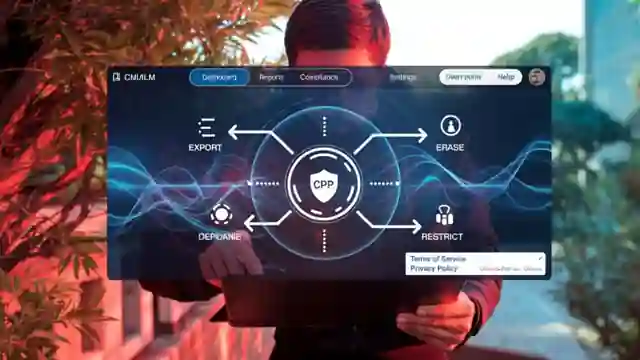

MLM software data governance is the framework that ensures all distributor and customer information within a multi-level marketing system is managed securely, accurately, and in compliance with global data privacy laws. It involves setting policies and automated workflows to handle Data Subject Requests (DSRs) such as exporting, erasing, or restricting personal data, in line with regulations like GDPR and CCPA. In simple terms, it’s about giving individuals control over their data while helping MLM businesses stay legally compliant and operationally efficient.
In today’s data-driven business landscape, compliance is not optional—it’s essential. For MLM businesses, data governance has become one of the biggest challenges, especially with strict data privacy laws such as
GDPR (General Data Protection Regulation), CCPA (California Consumer Privacy Act), and other regional policies. One of the most crucial aspects of compliance is DSR (Data Subject Request) automation,
where individuals can request access, deletion, or restriction of their personal data.
For MLM businesses, handling these requests manually is time-consuming, error-prone, and risky. This is where MLM software with built-in DSR automation comes into play, offering an end-to-end workflow for exporting, erasing, and restricting data.
In this blog, we’ll explore what DSR automation is, why it matters in MLM, and how MLM software ensures compliance through automated workflows.
DSR (Data Subject Request) refers to an individual’s right to control their personal data, including:
Automation ensures these requests are handled
seamlessly, quickly, and securely without burdening IT or compliance teams.
| Challenge | Risk Without Automation | Benefit of Automation |
|---|---|---|
| Large distributor networks | Manual handling becomes chaotic | Centralized, structured requests |
| Strict compliance laws | Heavy fines for non-compliance | Built-in GDPR/CCPA compliance |
| Trust & transparency | Lack of control reduces trust | Improves credibility with distributors |
| Manual delays | Errors, delays, and bottlenecks | Faster, error-free responses |
| Audit requirements | Missing logs create legal issues | Automated reports for auditors |
For MLM businesses managing thousands of distributors across multiple regions,
automation ensures accuracy, compliance, and trust.
Here’s how an MLM software handles the full DSR process:
1. Request Initiation
| Verification Method | Purpose | Security Level |
|---|---|---|
| Password + ID | Basic validation | Medium |
| 2FA (SMS/Email OTP) | Prevent impersonation | High |
| KYC (Govt. ID upload) | Strongest verification | Very High |
a) Export Data
b) Erase Data
c) Restrict Data
This log ensures audit readiness in case of regulatory inspections.
| Request ID | Type | Status | Date Completed | Admin |
|---|---|---|---|---|
| #1123 | Export | Completed | 10 Aug 2025 | System |
| #1124 | Erase | Completed | 12 Aug 2025 | Admin1 |
| #1125 | Restrict | Pending | 15 Aug 2025 | System |
With growing regulatory scrutiny, MLM software will evolve to include:
Data governance is no longer an afterthought—it is a business-critical requirement.
For MLM companies, where massive amounts of distributor data are stored and processed daily,
DSR automation ensures compliance, builds trust, and reduces operational overheads.
By implementing export, erase, and restrict workflows within MLM software,
businesses not only safeguard themselves from regulatory risks but also demonstrate
ethical responsibility towards their distributors.
As privacy laws expand worldwide, MLM companies that adopt
automated data governance today will be the ones who stay ahead tomorrow.
Q1. What is Data Governance in MLM software?
Data Governance in MLM software is the framework and automated process that ensures member and distributor data is handled securely, accurately, and in compliance with global privacy laws.
Q2. Why is automating DSR export, erase, and restrict important?
Automation reduces manual errors, accelerates compliance, and guarantees that user requests are managed consistently across the MLM system.
Q3. How does DSR export work in MLM platforms?
It enables members to request a copy of their personal data, such as transactions and account records, in a secure, machine-readable format.
Q4. What does DSR erase mean in practice?
This process permanently deletes a member’s personal data across databases, integrations, and backups — supporting the “right to be forgotten.”
Q5. What is DSR restrict and when is it applied?
Restriction allows a member’s data to be preserved but not processed — typically during disputes, compliance checks, or audits.
Q6. Which regulations make DSR automation essential?
Laws such as GDPR, CCPA/CPRA, and LGPD mandate that businesses fulfill user data rights requests promptly, making automation a critical requirement.
Q7. What are the benefits of end-to-end workflow automation in MLM data governance?
Automation strengthens trust, reduces costs, speeds up compliance, and lowers the risk of fines — while ensuring operational efficiency.